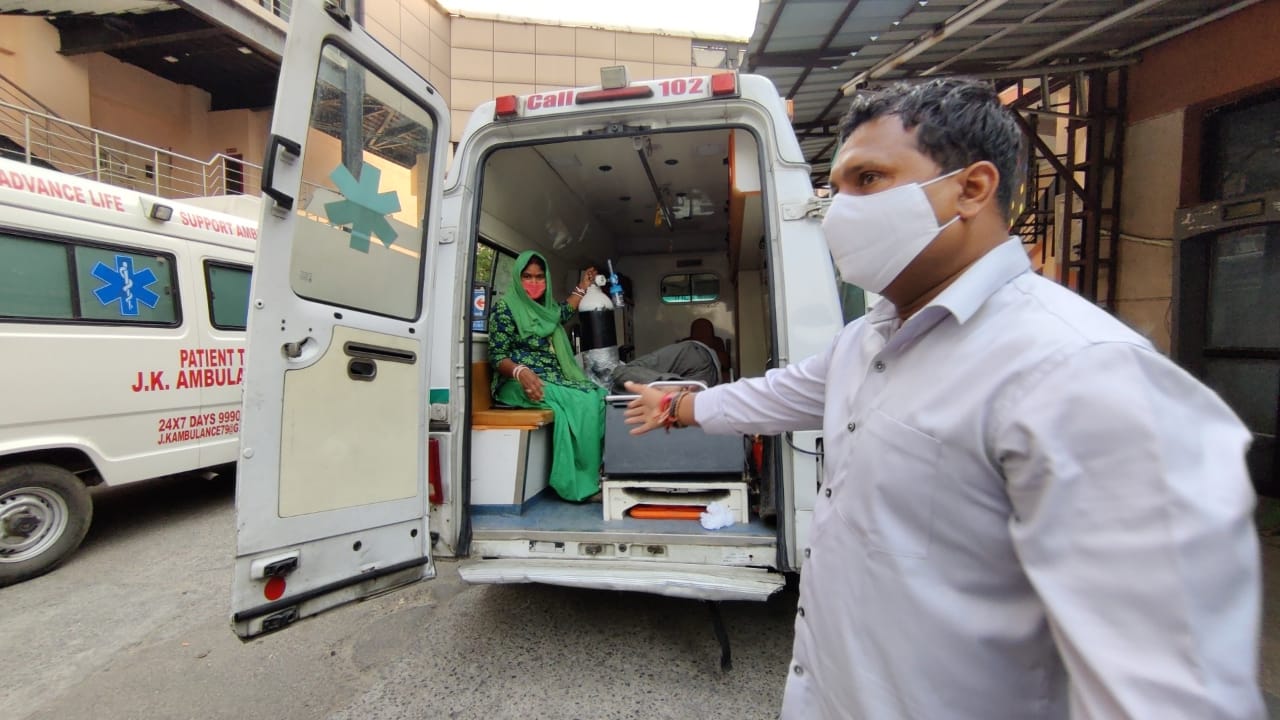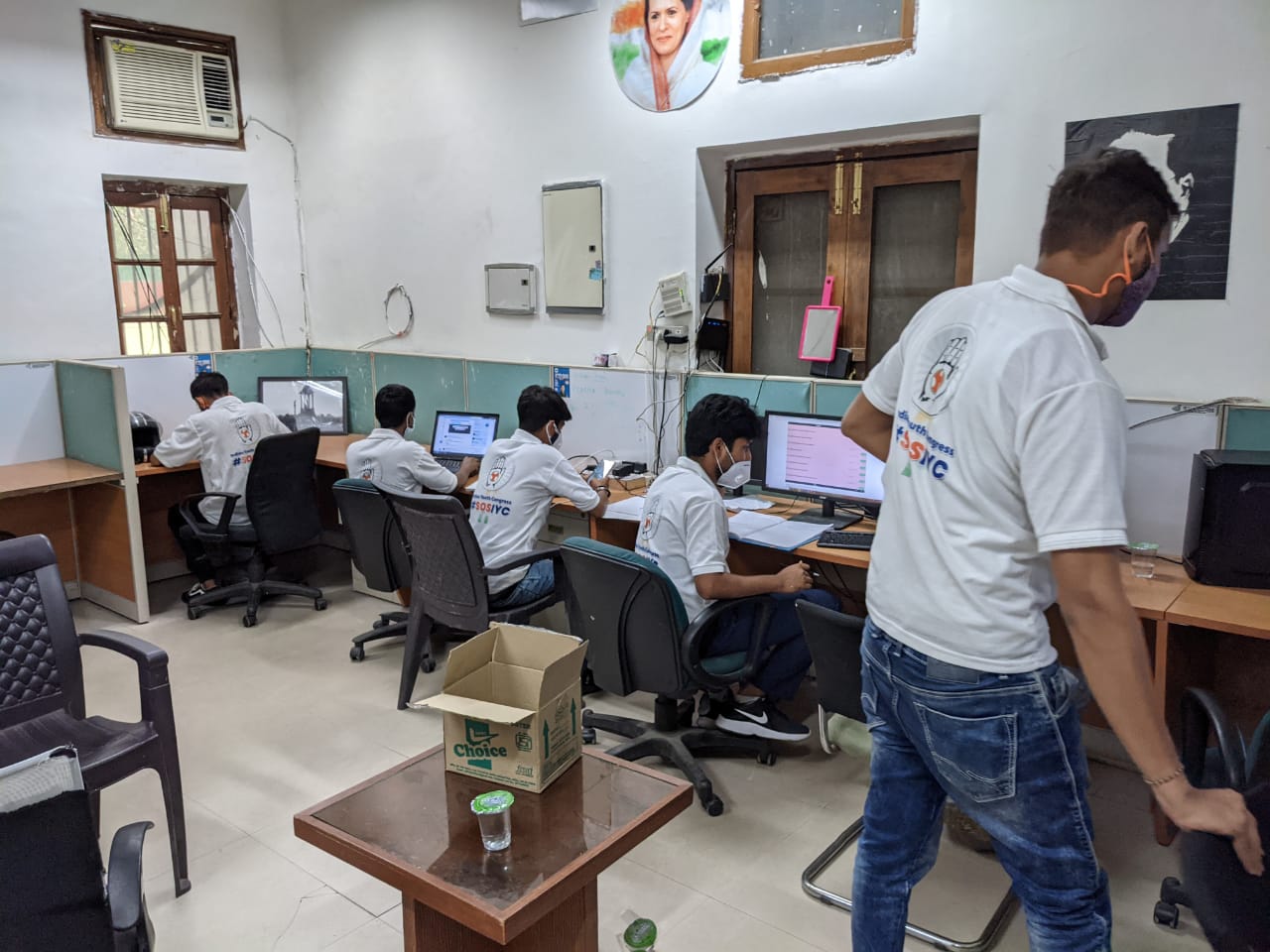The volunteers on the frontline of India’s Covid crisis as healthcare system collapses
As India’s healthcare infrastructure struggles to deal with the Covid crisis, a large army of volunteers is doing its best to fill the gap, reports Stuti Mishra in Delhi


When Mahua Rai Chaudhary found out her 80-year-old father’s oxygen levels were dipping below 85 – a level of above 95 is considered normal – she made frantic calls to every hospital in the national capital, government helplines, and oxygen vendors. But after hours of trying, all she encountered were busy lines and scammers ready to dupe her.
However, like thousands of Indians, what worked for her is a request for help on social media. And in what she repeatedly describes as a “divine intervention”, her father received an oxygen cylinder within hours, as her post reached Srinivas BV, head of the youth wing of India’s opposition party Congress, who has been running an assistance campaign in the country as India’s healthcare system shatters.
“I was searching for the oxygen cylinder everywhere, but within hours of the post, I got a call from a person I didn’t know, saying the cylinder will be sent to me. I was shocked,” says Chaudhary, an HR professional. However, after two days, her father passed away. She says the organisation also helped cremate her father.
She is among many Indians who are receiving more help from volunteers online than from any government helpline. As India’s coronavirus crisis deepens, the country has been reporting a weekly average of over 350,000 infections, with people dying on roads and in hospitals, scrambling for oxygen and medical supplies, and cremations taking place in parks.
Amid the failing healthcare infrastructure, Indian Twitter is flooded with SOS calls from different cities and many volunteer groups working day and night, helping people by amplifying requests and verifying leads. Doctors are providing free consultations and gurdwaras are delivering free food; however, with resources being exhausted, the pressure is increasing.
Srinivas’s organisation is one of the many that have taken it upon themselves to help others out, winning laurels on social media. The 41-year-old and his team of 1,000 volunteers in different cities are taking up to 15,000 SOS calls each day, as their “SOSIYC” hashtag garners thousands of requests on Twitter alone.
The Independent visited Srinivas’s war room in central Delhi at the office of the Indian Youth Congress (IYC), where several volunteers, many of whom are students, track the requests pouring in from various platforms. From arranging hospital beds to providing oxygen, medicines, food for patients and their families, and even space for cremations, he and his team of a thousand volunteers are running from pillar to post to help people.
“We are keeping track of calls for help on Twitter, Facebook and WhatsApp. We have groups from every district of India,” Srinivas tells The Independent. “We try to help as many people as we can.”

He says his organisation launched the “SOSIYC” hashtag on 5 April so people could reach out for help, however the flow of requests greatly increased soon after. “That’s when we realised it is getting worse.”
“We formed teams for different requests: some volunteers are focused on just hospital beds, some for oxygen, some look at plasma requests,” he says. “Sometimes it’s difficult to convince people to donate plasma; we get their consultations done with doctors to convince them it is risk-free.”
The office has large stocks of wheat and rice lying outside near the entrance, and food is cooked in massive quantities. “People are served food free of cost here,” one volunteer says. “We also provide food outside hospitals to the patients and families waiting outside.
“We also have a team to collect samples, because people were unable to book tests and could not be verified as Covid patients,” says Srinivas. His team has been working round the clock for patients in need of care for conditions other than Covid, as he points out that the hospitals being overwhelmed means that those with diseases such as cancer are also suffering.
He says his own team of helpers, who are risking their lives to help people, haven’t had the time to get tested yet. “Our volunteers stay till late at night or early morning. Many sleep here in the office. We are trying our best to stay protected – we are double-masking and maintain distance.”

As Srinivas explains his initiatives, his phone keeps ringing every few minutes with people asking for Covid-related help. He has two people waiting outside for oxygen cylinders. But he gives one empty cylinder to a person who is now going to get it filled.
Despite not being a pharmacist, or a high-profile politician with access to various means, Srinivas says he stepped in with his limited resources as his party president backed him, and he believed that even if he saves one life “it is worth it”.
Among many who reached out to Srinivas for help were a doctor couple who could not find plasma for therapy when they were admitted to the hospital where they usually work. Dr Jasgir Gill says his frantic calls for help didn’t yield any result until his pleas reached IYC.
“We tried everything and anything that we could find, but at that time and even today it is so difficult to find resources,” he says, “There’s actually a scarcity of essentials. We were lucky enough to find people who were helpful.”
With increasing cases and resources running low, Srinivas’s team is also facing increasing difficulties. He says “We can’t help everyone now – we receive over 10,000 requests from different corners of the country – but we are trying to prioritise emergency cases.”
IYC has now released a link for donations, but so far his team has provided several services for free, he claims. “We have rented cylinders, so if someone needs oxygen they just pay for that cost. We guide people to available resources. For those who can’t afford it, we give it for free.”
However, now that resources are so depleted, Srinivas says it is hard to obtain them at all. “We are ready to work day and night, but at the same time, things also have to be available [to purchase]. What will we do if they aren’t? Things like oxygen are [all gone].”
The 41-year-old says it is not the time for politics but for saving lives. However, the biggest thing the government in India lacks today is coordination, he says – a problem which is claiming lives.
“Why are people dying? It’s not just because of corona[virus]. It is the absence of basic treatment,” says Srinivas. “People are panicked, they are running from one hospital to another ... a big percentage of those who died [were killed by] heart attacks outside hospitals.”
He also says the Narendra Modi government lost precious time between the first wave and the second by not planning better.
“The government only increased ICU beds in Delhi [to 220]. They had one year to prepare. Full families are testing positive; where will you admit them?” he says. “If the government did not export vaccines and oxygen, there wouldn’t have been any shortage.
“There are families where all members have tested positive. People are starving in their homes. We contact our volunteers and send them food at home.”
Before entering politics and activism, Srinivas played in India’s under-19 cricket team.
He credits his party chief, Rahul Gandhi, and other senior members of the Gandhi family. Despite the concerns of his own family and the families of the volunteers involved, Srinivas insists that as leader of a youth organisation, it is his duty to help people during this unprecedented crisis.
Join our commenting forum
Join thought-provoking conversations, follow other Independent readers and see their replies
Comments